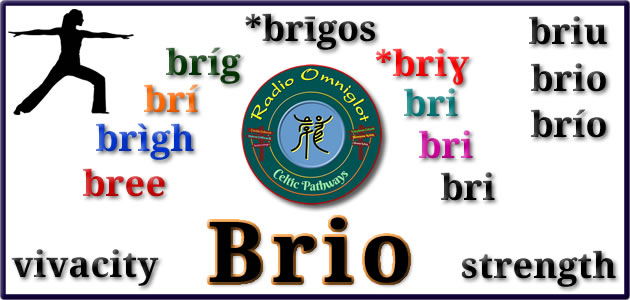Podcast: Play in new window | Download
In this episode we discover the Celtic power behind some vigorous Romance and English words.

The English word brio [ˈbɹiːoʊ] means vigour or vivacity. When used in musical directions, as con brio, it means with spirit, with vigour, vivciously [source].
It comes from Italian brio (vivacity, liveliness), from Spanish brío (vigour, mettle, zest, zeal), from Old Occitan briu (wild), from Gaulish *brīgos (strength), from Proto-Celtic *brīgos (power, worth), possibly from PIE *bʰerǵʰ- (to rise; high) [source].
Related words in the modern Celtic languages include:
- brí [brʲiː] = strength, vigour; force, significance, influence or merit in Irish
- brìgh [brʲiː] = essence, gist, matter, pith, purport or substance in Scottish Gaelic
- bree = power, energy, stamina or vigour in Manx
- bri [briː] = honour, dignity, reputation, fame or prestige in Welsh
- bri = distinction, importance, relevance or reputation in Cornish
- bri [briː] = dignity or honour in Breton
Other words from the same Proto-Celtic roots include briu (energy, push, courage) in Catalan, brio (brilliance, panache) in French, and brio in Italian, brío in Spanish (as mentioned above).
Words from the same PIE roots possibly include barrow, burrow, bury, effort, force and fort in English, and brenin (king), bwrw (to hit, strike, cast) in Welsh [Source].
Incidentally, the musical direction forte (f), which indicates that a passage in music is to be played loudly or strongly, also comes from the same PIE roots, via Italian and Latin, as does the English word forte (strength, talent), though via Middle French [Source].
More about words for Strength and related things in Celtic languages.
You can find more connections between Celtic languages on the Celtiadur blog. I also write about words, etymology and other language-related topics on the Omniglot Blog.
Radio Omniglot podcasts are brought to you in association with Blubrry Podcast Hosting, a great place to host your podcasts. Get your first month free with the promo code omniglot.

In Sweden, there is a very well-known toy maker called Brio
(they are famous for their wooden toys).
I do not know if the name has its origins in the old landguages
or if it is an acronym like Ikea.
According to Wikipedia, BRIO is an acronym:
Brio (stylized BRIO) is a wooden toy company founded in Sweden. The company was founded in the small town of Boalt, Scania, Götaland in 1884 by basket maker Ivar Bengtsson. For a long time the company was based in Osby, Scania, in southern Sweden. In 1908 Ivar’s three sons took the company over and gave it the name “BRIO”, which is an acronym for: BRöderna (‘the brothers’) Ivarsson (in) Osby.
https://en.wikipedia.org/wiki/Brio_(company)